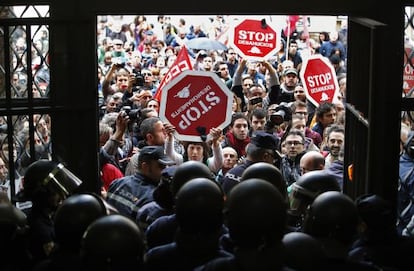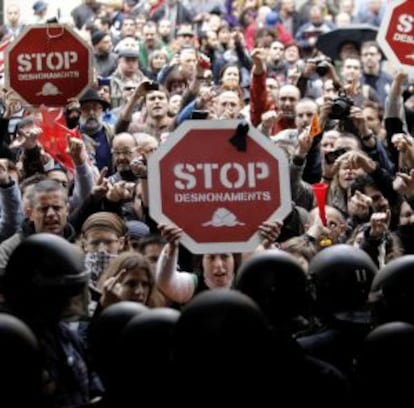Madrid demonstration leads general strike as Spain comes to a standstill
Labor unions place overall participation at over nine million workers Over 100 protestors arrested during clashes with police; 18 officers injured AENA reports delays across country, with some 700 flights grounded by stoppage

Most of Spain was immobilized on Wednesday as workers stayed away from their jobs, industries ground to a halt and public transport slowed the country down during the second general strike within a year called by the nation’s main labor unions in protest at conservative Prime Minister Mariano Rajoy’s austerity policies.
Anti-government demonstrations rounded off the day in major cities across Spain, with the march in Madrid expected to be the best supported. Police cordoned off Congress in anticipation of protests around the lower house of parliament. Scuffles broke out during the morning between demonstrators, workers who crossed picket lines and police at some businesses which tried to open their doors.
Some 110 people have been arrested across the country. At least 40 others were reported injured, including 18 law enforcement officers. In the capital, a police charge against protestors in the Cibeles square left 15 people injured while in Valencia 10 picketers were arrested and six more protestors were injured later in scuffles with police outside the city's bull ring. In Tarragona, two workers were injured after being hit by trucks at picket lines. One of the drivers was arrested. Also in Tarragona, a minor was injured and three more arrested when police attempted to break up a picket outside the El Corte Inglés department store.
In Madrid, a man and a woman detained by security forces were found to be carrying explosive equipment, including gasoline, nails and a large firework. In Asturias, a rocket fired at a Civil Guard van caused its inhabitants to evacuate suffering from smoke inhalation.
Government officials complained that transportation and other public services were functioning at a lower rate than the minimum services agreed upon by the CCOO and UGT unions, which called the strike. Nevertheless, the administration reported that most businesses opened as usual.
The CCOO, UGT and USOC labor unions put the overall participation in the strike early on in the day at 85 percent nationwide and 95 percent in industry in Catalonia, Spain’s most powerful region in economic terms.
No port of call
The unions said the strike was a 100-percent success at all ports, which were shut down shortly after midnight on Tuesday. The metals, automotive and construction industries also reported high absenteeism, the unions said.
“The stoppage in industry is practically complete although there have been minor exceptions at the Renault and Citroën factories,” said UGT communications secretary José Javier Cubillo.
However, electricity consumption indicated that the participation rate in the stoppage was lower than in previous national strikes in March of this year and in September of 2010. According to the national grid operator REE, demand for electricity attributable to productive activity in constant terms indicated that 60 percent of workers had adhered to the call to lay down tools, compared with 91.8 percent in March, also against Rajoy’s Popular Party (PP) government, and 73 percent two years ago when the Socialist Party was in power. In the afternoon, the unions released a definitive figure for the number of workers who had heeded the call to lay down their tools: 9,185,383, 12.2 percent fewer than the previous general strike in March. There are currently 14.23 million salaried workers in Spain.

Among broadcasters, private television channels continued with scheduled news bulletins but the state-owned RTVE did not broadcast. Neither did RTVE labor representatives guarantee that Spain's soccer match against Panama would be shown in the evening. In Madrid, most theaters dropped their curtains for the day and filming on television and movie sets ceased.
“We are deeply grateful to workers who have followed the strike in such a difficult situation, with almost six million people out of work,” the secretary general of UGT, Cándido Méndez, said. “We demand a complete change in the government’s policies otherwise we’re heading for a precipice.”
Spain’s unemployment rate rose to above 25 percent for the first time on record in the third quarter of this year, and the country is now in its second recession in three years.
Rajoy's road map
Despite the protests, Rajoy has said that he will not back away from his austerity measures. Economy Minister Luis de Guindos said a general strike “is not the right way to reduce uncertainty.” “We are aware of the problems facing people but the government’s road map is the only possible alternative,” he added.
Early in the morning, one of Madrid’s main thoroughfares, Gran Vía, was cut off by some 400 protestors for more than an hour. Police had to forcibly push back demonstrators to the sidewalks to open the wide street to traffic. Some 20 police riot vans guarded some of the biggest establishments in downtown Madrid, such as El Corte Inglés department store where police had to escort workers inside the building.
Flights to and from major airports, including Madrid’s Barajas International Airport, suffered delays or cancellations. In all, it was expected that 700 scheduled flights would be cancelled during the day, with 1,344 of the 2,322 flights on airport authority AENA's log protected under the minimum service agreement.
At Mercamadrid, the capital’s main food supplier to grocers and supermarkets, picketers stood watch shortly after midnight to try to prevent trucks from leaving the installations.
The strike -- the ninth to be held since democracy was restored in 1975 -- was called to protest Prime Minister Mariano Rajoy’s austerity measures, including budget cuts in health and education and hikes in personal income tax and value added tax (VAT). The CCOO and UGT are also upset that the conservative PP government has brought in a labor reform that makes it easier and cheaper for companies to lay off workers.
Portugal on strike
The stoppage in Spain coincided with other strikes and protests across Europe. Labor unions and media in Portugal said that adherence to the stoppage was irregular in schools and public services but high in public transport and low in retail outlets.
Nevertheless, the general Confederation of Portuguese Workers (CGTP), which called the strike, described it as a success, putting the participation rate in many services, above all transport, at over 90 percent.
The government remained silent on the stoppage and did not provide figures on the participation rate.
There were few incidents reported with minor scuffles with picketers and only one arrest reported. CGTP sources said police were out in force at transportation hubs. Spanish newswire Efe reported long lines of people waiting for buses in Lisbon, with subway stations closed.
Portugal’s jobless rate rose to a euro-era record of 15.8 percent in the third quarter as the economy shrank for the eight quarter in a row.
Tu suscripción se está usando en otro dispositivo
¿Quieres añadir otro usuario a tu suscripción?
Si continúas leyendo en este dispositivo, no se podrá leer en el otro.
FlechaTu suscripción se está usando en otro dispositivo y solo puedes acceder a EL PAÍS desde un dispositivo a la vez.
Si quieres compartir tu cuenta, cambia tu suscripción a la modalidad Premium, así podrás añadir otro usuario. Cada uno accederá con su propia cuenta de email, lo que os permitirá personalizar vuestra experiencia en EL PAÍS.
¿Tienes una suscripción de empresa? Accede aquí para contratar más cuentas.
En el caso de no saber quién está usando tu cuenta, te recomendamos cambiar tu contraseña aquí.
Si decides continuar compartiendo tu cuenta, este mensaje se mostrará en tu dispositivo y en el de la otra persona que está usando tu cuenta de forma indefinida, afectando a tu experiencia de lectura. Puedes consultar aquí los términos y condiciones de la suscripción digital.








































